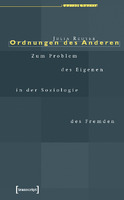Ordnungen des Anderen
Zum Problem des Eigenen in der Soziologie des Fremden
Abstract
Begegnungen mit dem Fremden sind uns vertraut, auch wenn wir den Anderen dabei häufig als unvertraut wahrnehmen. Doch es sind weniger die fremden, als vielmehr die eigenen Wirklichkeitsvorstellungen und Umgangspraktiken, die den »Einen« zum »Anderen« machen. Die Autorin analysiert diese Praktiken der Fremdsetzung, die sich von der alltäglichen Etikettierung und Stigmatisierung bis hin zu wissenschaftlichen Praktiken des »Othering« erstrecken: Rekonstruiert werden sowohl Simmels »Händler«, Parks »Mulatte«, Schütz' »Emigrant«, Meads »signifikanter/verallgemeinerter Andere« als auch ethnografische Praktiken der »Ver-Anderung« des Fremden. Dabei wird der Blick immer wieder von den vertrauten Bildern des Fremden hin zu ihren subtilen Herstellungsprozessen und Resonanzen gelenkt, was es möglich macht, von den Konstruktionen des Fremden auf die Konstruktionen des Eigenen zurückzuschließen.
Keywords
Fremdheit; Stigmatisierung; »Othering«; Sozialität; Soziologische Theorie; Kultursoziologie; Wissenssoziologie; Soziologie; Social Relations; Sociological Theory; Sociology of Culture; Sociology of Knowledge; SociologyDOI
10.14361/9783839400845ISBN
9783933127846Publisher
transcript VerlagPublisher website
https://www.transcript-verlag.de/Publication date and place
Bielefeld, 2002Series
Sozialtheorie,Classification
Cultural studies
Social theory


 Download
Download Web Shop
Web Shop